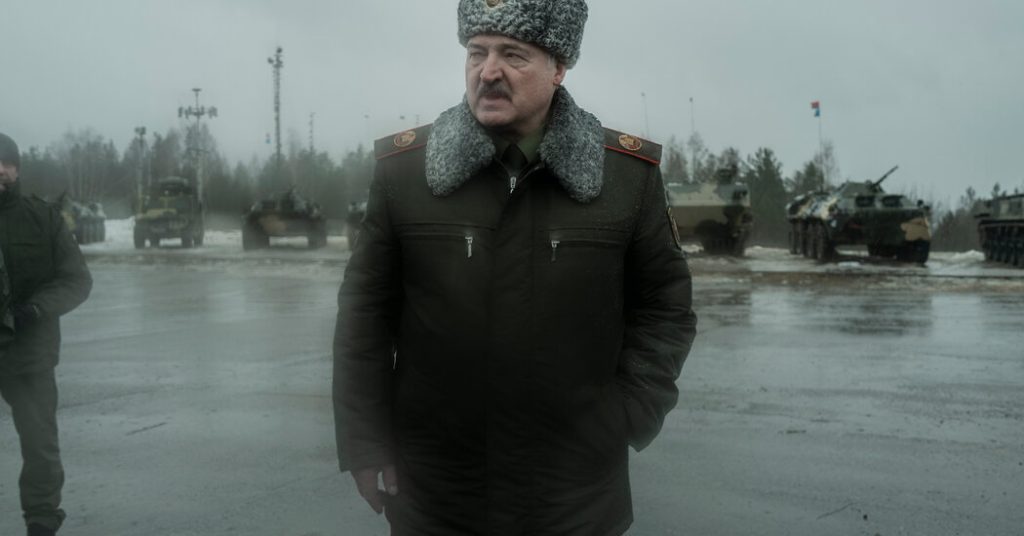The senior American diplomat slipped quietly into Belarus, a police state run by a strongman reviled for decades in the West, traveling by car across the border for meetings with President Aleksandr G. Lukashenko and the head of his KGB security apparatus.
It was Mr. Lukashenko’s first meeting with a senior State Department official in five years, and the start of what could be a highly consequential thawing of frozen relations between the United States and Russia’s closest ally.
The below-the-radar American visit to Minsk, the Belarusian capital, on Wednesday came just a day after President Trump had a long telephone call with President Vladimir V. Putin of Russia. Both events signaled Washington’s departure from a yearslong policy of trying to isolate leaders out of favor in the West because of their repressive policies and the war in Ukraine.
After talks with Mr. Lukashenko, Christopher W. Smith, a deputy assistant secretary of state, and two other American officials drove to a village near the border with Lithuania. There, courtesy of the Belarusian KGB, three people who had been jailed — an American and two Belarusian political prisoners — were waiting to be picked up.
As darkness fell, the Americans and the freed prisoners drove back across the border to Vilnius, the Lithuanian capital. Speaking outside the U.S. Embassy there on Wednesday evening, Mr. Smith hailed the successful completion of what he called “a special operation,” describing the prisoners’ release as a “huge win and a response to President Trump’s peace through strength agenda.”
The next step, Mr. Smith told a gathering of Western diplomats on Thursday in Vilnius, according to people who attended, is a possible grand bargain under which Mr. Lukashenko would release a slew of political prisoners, including prominent ones. In return, the United States would relax sanctions on Belarusian banks and exports of potash, a key ingredient in fertilizer, of which Belarus is a major producer.
The people who relayed Mr. Smith’s account of his talks in Minsk spoke on the condition of anonymity to discuss a confidential meeting. Mr. Smith himself has not publicly disclosed whom he met with or what was discussed, and the State Department did not respond to questions about those details.
Belarus, which usually gloats over any sign that it is breaking out of its isolation, has also been mostly silent, though an anchor on state television, Igor Tur, introduced a note of mystery, suggesting that Mr. Smith was not the real leader of the American delegation and that a more senior official also took part.
Franak Viacorka, the chief of staff to the exiled opposition leader Svetlana Tikhanovskaya, who has long called for toughening of sanctions, said: “We are very grateful to President Trump that he managed to move things forward.” But, he added, sanctions should be eased only when “Lukashenko stops repression and new arrests” and “releases all political prisoners, including top figures.”
Viasna, a human rights group that keeps a tally of political prisoners in Belarus, put their number this week at 1,226. Mr. Lukashenko has in recent months released more than 200 of them, including two Americans set free since Mr. Trump took office, but opposition activists say that even more people have been arrested during the same period.
Tatyana Khomich, a sister of one of Belarus’s most prominent political prisoners, Maria Kolesnikova, welcomed the American outreach to Mr. Lukashenko. “The past pressure strategy has failed to release political prisoners, halt repression or change the regime’s behavior,” she said.
Mr. Smith also steered Belarus policy during the Biden administration, and started tentative discussions last year with U.S. allies about easing sanctions, but until this week he had never traveled to Minsk to meet Mr. Lukashenko.
That “direct diplomatic approach could yield concrete results, including the release of individual prisoners or even a broader amnesty,” Ms. Khomich said, while loosening Belarus’s dependence on Russia and “preserving some leverage for the U.S. and E.U.”
An American-led drive to isolate and bankrupt Mr. Lukashenko under the Biden administration produced a raft of Western penalties. The sanctions on potash cut an important economic lifeline for the Belarusian ruler but handed a windfall to Russia, another big producer, as global prices spiked. Some Belarusian potash continued to reach global markets via Russia, instead of by the previous, cheaper route through Lithuania.
Artyom Shraibman, a political analyst who fled Belarus after a brutal crackdown on protests in 2020, said Western sanctions had little impact because of Russia’s expansive support for Mr. Lukashenko. But a release of prisoners in return for relaxing sanctions, he said, would “mean they have finally been used with some effect.”
“This would be definitely a positive development for the prisoners themselves, their families — and potentially for solving broader issues of the relationship” between Belarus and the West, said Mr. Schraibman, a nonresident scholar at the Carnegie Russia Eurasia Center.
How to deal with Mr. Lukashenko has vexed Western policymakers for decades. A master at maneuvering between East and West, and silencing his critics at home, he took power in 1994 and has won seven increasingly dubious elections in a row, most recently in January, when he claimed 87 percent of the vote, his biggest landslide yet.
In 2005, the U.S. secretary of state at the time, Condoleezza Rice, denounced Belarus as the “last true remaining dictatorship in the heart of Europe” — though that was before Mr. Putin consolidated his autocratic control of Russia.
Dispirited by the longevity of Mr. Lukashenko, now 70, his exiled opponents, like Mr. Putin’s, have often sought solace in rumors that he was seriously ill. But Mr. Smith, briefing Western diplomats in Vilnius, reported that Mr. Lukashenko showed no sign of ill health and seemed confident and in full control, several of those who attended said.
Beginning a decade ago, efforts to isolate Mr. Lukashenko gave way for a time to engagement, amid signs that Belarus wanted to avoid becoming too dependent on Moscow, the country’s increasingly overbearing neighbor.
While heavily reliant on Russia for deliveries of cheap oil, which he needed to keep his faltering economy afloat, Mr. Lukashenko resisted pressure from Mr. Putin to fully implement a 1990s agreement to form a “union state” that he feared would reduce Belarus to a province of Russia.
Mr. Lukashenko appealed to Mr. Putin, who rushed in security advisers to help restore control. Vicious repression followed, with mass arrests and torture of detainees.
Less than a year and a half later, Mr. Lukashenko allowed Russia to use his country as a staging ground for its full-scale invasion of Ukraine, with an abortive thrust south from Belarus toward Kyiv.
Mr. Smith, according to diplomats who attended his briefing, said the primary U.S. goal was to secure freedom for more political prisoners. He said he had asked Mr. Lukashenko whether he was ready to scale back repression and was assured that he was. Another important aim, Mr. Smith told the diplomats, is to give Mr. Lukashenko some breathing room outside Russia’s orbit of influence.
Piotr Krawczyk, a former head of Poland’s foreign intelligence service who worked with the first Trump administration on loosening Russia’s grip on Belarus, said Belarus was “part of a wider American approach toward Russia.”
The United States is “confronting Russia in Ukraine, in Africa, in the oil and gas sector, and in several other strategic areas,” he said. “Negotiating with Belarus creates additional leverage for the U.S. to signal to Russia that they should be more attentive to American arguments.”
Mr. Shraibman, the exiled analyst, said a big question now was how the Kremlin would react to any rapprochement between Belarus and the West. Many Russian officials “would likely panic at the prospect,” he said, but “there is no quick or easy way for Belarus to distance itself from Russia given Moscow’s economic dominance over the country.”
He added that it was unlikely that President Trump “has any particular interest in, understanding of or a plan for Belarus.” Even so, he said, the “Trump factor certainly creates some momentum, as everyone, including Lukashenko, tries to impress the U.S. president and compete for his attention.”








